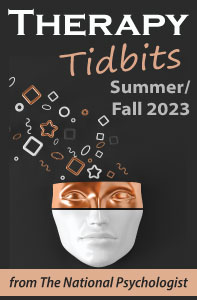We are launching our new website logins, account creation, and purchases are restricted. Any course activity is not being recorded until the new site has launched. Expected Launch Time 8:00pm EST Nov 20th.
$14

Related Courses

Therapy Tidbits – January/February 2018

Therapy Tidbits – September/October 2018
Therapy Tidbits – Summer/Fall 2023
The National Psychologist
Course Abstract
Therapy Tidbits – Summer/Fall 2023 is a 1-hour online continuing education (CE) course comprised of select articles from the current issue of The National Psychologist, a private, independent, online newsletter intended to keep psychologists informed about practice issues.
The articles included in this course are:
Course #11-54 | 2023 | 19 pages | 10 posttest questions
Learning Objectives
Professional Development Resources is approved by the American Psychological Association (APA) to sponsor continuing education for psychologists. Professional Development Resources maintains responsibility for this program and its content.
Professional Development Resources is CE Broker compliant (#50-1635 - all courses are reported within two business days of completion). Professional Development Resources, Inc. is recognized by the New York State Education Department’s State Board for Psychology as an approved provider of continuing education for licensed psychologists (#PSY-0145).
This online course provides instant access to the course materials (PDF download) and CE test. The course is text-based (reading) and the CE test is open-book (you can print the test to mark your answers on it while reading the course document).
Successful completion of this course involves passing an online test (80% required, 3 chances to take) and we ask that you also complete a brief course evaluation. Click here to learn more.
Have a question? Contact us. We’re here to help!
The National Psychologist is a private, independent online newspaper intended to keep psychologists informed about practice issues. Contributions and letters are invited. The editor reserves the right to edit articles and submissions for clarity and/or to meet specific space limitations. Publication staff is not responsible for opinions or facts in bylined articles. Click here to subscribe to TNP.
Disclosure:
Financial: The content for this course was published by The National Psychologist.
Nonfinancial: No relevant nonfinancial relationships exist.
Customer Reviews